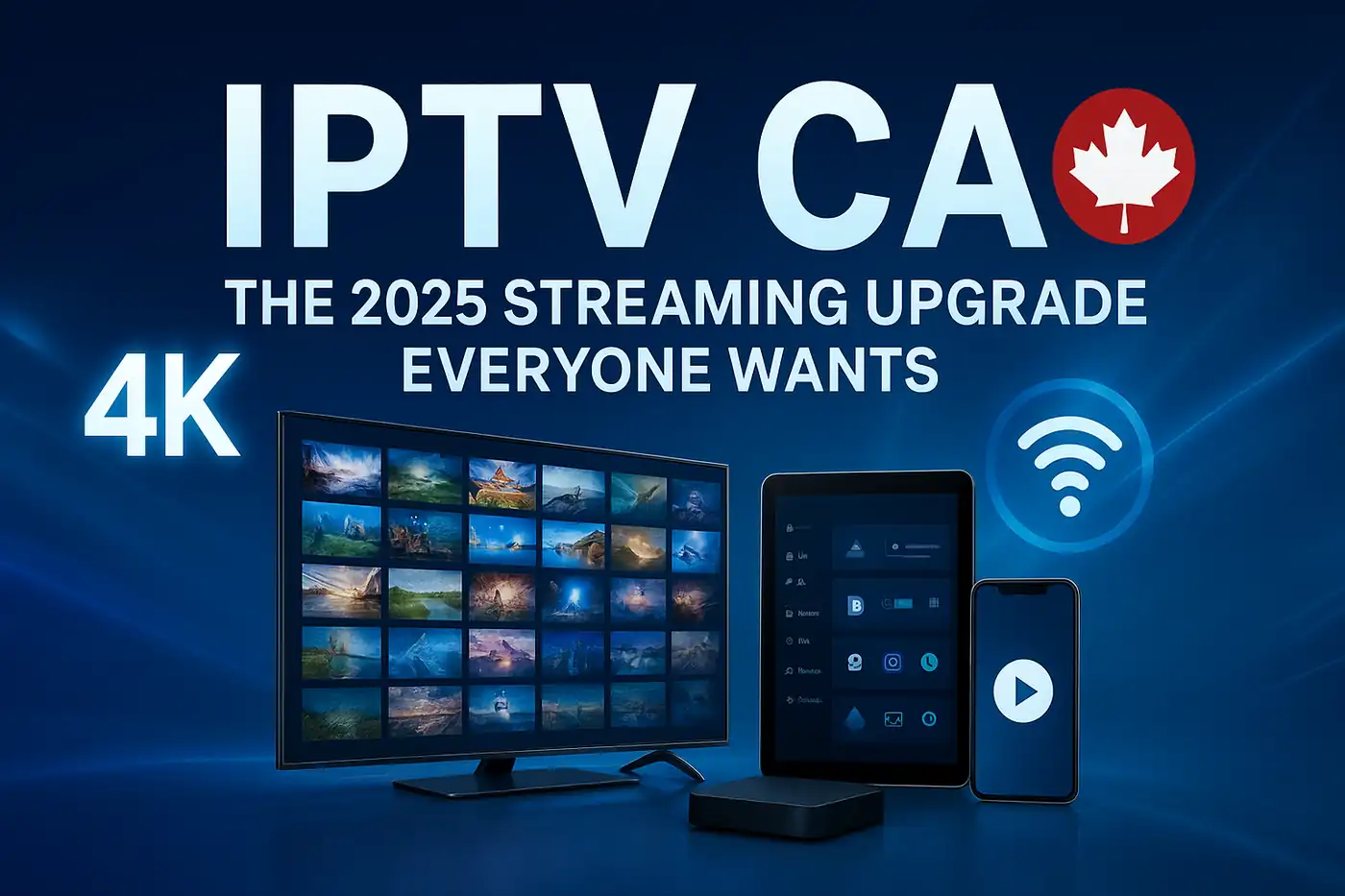Understanding the IPTV Service Landscape in Canada
When you look into an IPTV Service in Canada, you’ll find a range of providers—from major telecom giants to independent niche players. But what isn’t always obvious is the mix of technical, legal and consumer-experience factors behind the scenes.

What Exactly Is an IPTV Service?
Simply put, an IPTV (Internet Protocol Television) service uses your internet connection to deliver television channels and on-demand video rather than traditional cable or satellite networks. :contentReference[oaicite:0]{index=0}
However, unlike generic streaming apps, this kind of service often includes live broadcasting of traditional channels delivered via an IP network, plus features like cloud recording, interactive guides, and multi-device access.
Why It Matters in the Canadian Market
In Canada, the move from cable & satellite to internet-based delivery is accelerating. Many established providers now bundle high-speed internet with television via IP-networks. But for the consumer, choosing the right IPTV Service means understanding more than just “how many channels”. It means understanding licensing, bandwidth, device support, and long-term value.
Legal & Regulatory Checkpoints for a Legit IPTV Service
Because you’re in Canada, choosing a trustworthy IPTV Service means checking its legal status. Let’s break down the key regulatory pillars.
Licensing & the Role of the Canadian Radio‑television and Telecommunications Commission (CRTC)
An IPTV Service is legal when the provider is properly registered and has the rights to distribute the content. The CRTC mandates certain obligations for TV broadcasters and distribution platforms. :contentReference[oaicite:2]{index=2}
For example: major telecoms like Telus Corporation (Optik TV) and Bell Canada (Fibe TV) deliver their television product via IP and are fully licensed. :contentReference[oaicite:5]{index=5}
Risks of Unlicensed / “Grey-Market” Services
Some services claim to offer large channel line-ups for a very low cost, but operate in a legal grey zone or outright breach licensing. These carry risks: your service might be interrupted, your data compromised, or your internet provider may act. :contentReference[oaicite:6]{index=6}
Pro tip: if something sounds too good (billions of channels for very little money), it’s worth digging into the legal and licensing status.
New Regulations & the Online Streaming Act
Canada recently passed the Online Streaming Act (Bill C-11) to extend regulatory oversight of internet-based broadcasting. For a consumer choosing a service now, this means increased accountability from providers. :contentReference[oaicite:8]{index=8}
How to Choose the Best IPTV Service for You
Let’s look at the most important criteria. If a service fails on one or more of these, you may be buying into problems instead of solutions.
| Criteria | What to Check | Why It Matters |
|---|---|---|
| Licensing / Legal Status | Provider states they are registered, transparent about rights. | Ensures your service won’t be cut off and you won’t face unexpected issues. |
| Internet/Network Requirements | Minimum bandwidth, stability, device compatibility. | Achieves consistent smooth viewing, no buffering or drop-outs. |
| Device & App Support | Supports smart TVs, mobile, tablets, maybe set-top box. | Gives flexibility to watch on different screens and contexts. |
| Channel / Content Offering | List of channels, catch-up, on-demand, UHD/4K options. | You get the content you want — not just what's available generically. |
| Price & Contract Terms | Transparent pricing, no hidden fees, fair terms. | You avoid surprises and can compare value fairly. |
| Support & Reliability | Customer support, up-time guarantees, clear terms. | A reliable experience saves frustration and time. |
Quick Example: Why Some Services Fall Behind
Imagine a service that advertises “4 K channels + international support” at a very low price, but uses a shaky internet connection, has no dedicated app, and is not transparent about its licensing. What looks like a bargain today may become a frustration tomorrow.
Why Our Solution Stands Out
At streamiptv.ca, the aim is to deliver an IPTV Service that ticks all the boxes: legal compliance, strong network performance, device flexibility, and straightforward pricing. Here’s how we solve multiple problems at once:
- Problem: Hidden fees and fine print.
Solution: Transparent pricing with no surprises. - Problem: Buffering or inconsistent quality.
Solution: Verified min-bandwidth and optimized delivery. - Problem: Limited device support.
Solution: Broad device compatibility and easy setup. - Problem: Legal ambiguity.
Solution: Fully compliant provider operating in the Canadian regulatory framework. 
Technical Tips for Getting the Most Out of Your IPTV Service
Even the best service can under-perform if setup and environment aren’t optimal. Here are actionable tips:
1. Ensure Adequate Internet Speed
For an IPTV Service in Canada you typically need at least 50 Mbps download speed for HD streams, and higher (100-150+ Mbps) for 4K/UHD viewing. :contentReference[oaicite:9]{index=9} Also ensure low latency and minimal packet loss.
2. Use a Compatible Device & App
Smart TVs, streaming boxes (like Apple TV or Fire Stick), tablets and mobile phones all may work. A dedicated app often improves stability and features (like EPG, pause, rewind).
3. Optimize Your Home Network
If many devices share your bandwidth, consider wired connection or a strong WiFi router. Minimize interference, especially if live sports or events matter to you.
4. Check for Content & Channel List Updates
A good IPTV Service regularly updates its channel list and on-demand library. Ask about this upfront so you’re not stuck with stale content.

Common Questions and Clarifications (FAQ)
Q1: Is an IPTV Service legal in Canada?
Yes — using an IPTV Service is legal in Canada provided the provider has proper licensing and registration under Canadian broadcasting regulations. :contentReference[oaicite:10]{index=10} However, some unlicensed services exist and carry risk.
Q2: How do I know if the provider is licensed?
Check whether they disclose their licensing status, mention registration with the CRTC or similar oversight, provide transparent business info. If they hide those details or offer “too good to be true” pricing, that’s a red flag.
Q3: What happens if I pick a poor quality service?
You might face frequent buffering, limited channel/options, downtime, and risk of service interruption if the provider operates illegally. You may lose money and time.
Q4: Can I use it on multiple devices?
Yes — many quality providers support smart TVs, mobile apps, tablets, and streaming boxes. But you’ll want to check device limits (number of screens at once) and app compatibility.
Q5: What kind of internet speed do I need?
For standard HD streaming, aim for 50 Mbps or more. For 4K/UHD and simultaneous use on multiple devices, 100–150+ Mbps is advisable. :contentReference[oaicite:11]{index=11}
Q6: Are there hidden costs I should watch out for?
Yes — setup fees, maximum screens, contract lock-ins, price increases after promo period, device rental may all add cost. Always read the fine print.
Q7: Why choose streamiptv.ca?
Because we’ve designed our service to solve the key pain-points: legality, performance, transparency, and compatibility. If you want a reliable, full-feature IPTV Service in Canada, we’re the go-to solution.








Comments (0)